I had the great idea of doing a series of articles, ranking the top five radio detectives by Network (i.e. ABC, NBC, CBS, Mutual, and the syndicated shows.)
There was only one problem with the plan. Many radio programs didn’t just stay on one network. In some cases radio actors regularly jumped from network-to-network.
If actor’s change, it’s easy to differentiate between (for example) the 1947 NBC Summer replacement series, “The Adventures of Philip Marlowe” with Van Heflin and the 1948-50 and 1951 CBS Series, “The Adventures of Philip Marlowe” with Gerald Mohr. However, the problem was that several shows jumped networks with the exact same actors, and many of the shows where the star and show changed networks are among the absolute favorites that I’m sure to be asked about.
Thus our first top 5 list will look at Detective Series that played across multiple networks. In addition, I ran a poll on our Facebook page to see who listeners to the program thought was the best. 75 people took part in the survey. The fan results including the percentage of the vote that went for each Detective follow my thoughts on the series:
5) Herbert Marshall as Ken Thurston in, “The Man Called X”
Series Run: 1944-48, 1950-52
Networks: CBS (Summer 1944, 1947-48), The Blue Network (1944-45), NBC (Summer 1946, Summer 1947, 1950-52)
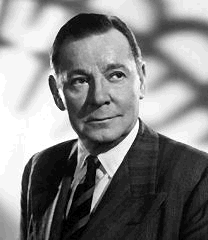 Marshall starred in this iconic role, as an international troubleshooter who faces danger, mystery, and adventures the world over. The British-born Marshall’s debonair performance gave the show class and style.
Marshall starred in this iconic role, as an international troubleshooter who faces danger, mystery, and adventures the world over. The British-born Marshall’s debonair performance gave the show class and style.
Unlike Dangerous Assignment, The Man Called X dealt more directly with America’s actual enemies. This gave Ken Thurston’s adventures the highest stakes in radio. While other mystery series were worrying about a plot to steal a $10,000 diamond necklace, Thurston was trying to stop someone from blowing up NATO.
The Man Called X came to television in a 1957 ZIV TV series with Barry Sullivan in the lead. The title also inspired the creators of the feature length Flintstones film, The Man Called Flintstones.
Fan Results: 3%
Fan Comments: Amanda who actually voted for the Saint shared, “I like a Man Called X, too. I suspect it’s not getting a lot of votes because not many people have heard of it..”
My response: This is true enough. Many of the spy dramas from the Cold War are considered “dated.” In addition, there were some poorly produced espionage shows, particularly those that appeared on television that gave some of the truly good programs a bad name. Hopefully, we’ll get to share some of the good ones in coming years.
4) The Saint with Vincent Price
Series Run: 1947-51
Networks: CBS (1947-48), Mutual (1949-50), NBC (1950-51)
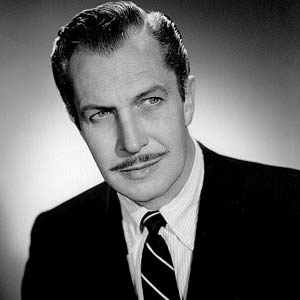 Vincent Price played many villains in his career, most famously horror movies and on the 1960s Batman TV series as Egghead. He also did several roles in inspirational television shows and movies.
Vincent Price played many villains in his career, most famously horror movies and on the 1960s Batman TV series as Egghead. He also did several roles in inspirational television shows and movies.
The Saint presented Price in a different role: that of detective hero. Price was not the first actor to play the Saint over the radio (there had been two 13-episode series aired in 1945 starring Edgar Barrier and Brian Aherne respectively). However, Price made the role of the Saint his own. While, the Saint was hardly a hard boiled private eye, the Saint’s quick wit and smart mouth were the equal of any detective on the radio.
Price’s style was a perfect mix of witty banter, charm, intelligence and toughness that makes each episode of the Saint with Vincent Price a pleasure to listen to.
During the Summer of 1951, Tom Conway took over the role until the series ended in the Fall. In the 1960s, future James Bond Roger Moore brought the Saint to British TV. In more recent years, a movie with Val Kilmer and a BBC radio adaptation have been made
Fan Vote: 5%
3) Howard Duff as Sam Spade
Series Run: 1946-50
Networks: ABC (1946), CBS (1946-49), NBC (1949-50)
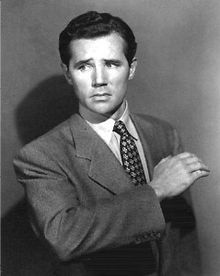 Duff’s Spade is one of radio’s most memorable characters. Spade was tough, sarcastic, a ladies man, and definitely not a boy scout.
Duff’s Spade is one of radio’s most memorable characters. Spade was tough, sarcastic, a ladies man, and definitely not a boy scout.
Stories were often tongue in cheek with plenty of humor throughout, as Spade would even occasionally mix in a reference to another detective, most notably the San Francisco-based Pat Novak and Johnny Madero. The highlight of each show was when he explained the case to his neurotic secretary Effie (played to perfection by Lurene Tuttle in her most memorable role.)
Two months after Duff’s last episode, Spade was brought back with Steve Dunne in the lead. The series folded after 24 episodes.
Fan Vote: 15%
Fan Comments: Dorothy who voted for Sam said, “It’s really a tie between Sam Spade and Richard Diamond for me but Spade’s taken my heart.” Score one for Howard Duff.
2) Basil Rathbone as Sherlock Holmes
Series Run: 1939-42, 1943-46
Networks: Blue Network (1939-42), Mutual (1943-46)
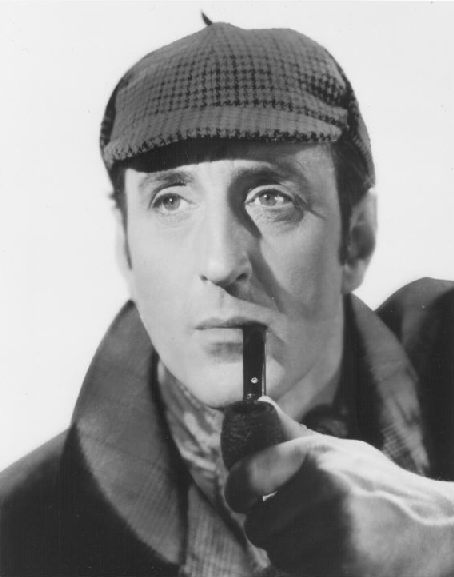 By far, Rathbone did more radio work as Holmes than any other actor: 217 episodes spread out over six seasons. The Rathbone-Bruce episodes are so sought after as the duo were Hollywood’s definitive Holmes and Watson, partially as a result of the radio programs. Without the radio programs, it’s doubtful that Universal would have revived the pairing.
By far, Rathbone did more radio work as Holmes than any other actor: 217 episodes spread out over six seasons. The Rathbone-Bruce episodes are so sought after as the duo were Hollywood’s definitive Holmes and Watson, partially as a result of the radio programs. Without the radio programs, it’s doubtful that Universal would have revived the pairing.
The series featured the personal chemistry between Rathbone and Bruce which had made the series such a winner on screen. The series included fine writing by Edith Meiser and later the Dennis Green and Anthony Boucher. The Green and Boucher episodes were noted for serious research and educational value, whether it was Guy Fawkes or the Blarney Stone, you’d most often learn something along the way. The episodes often included moments of culture with more than an average share of violins and beautiful singing voices popping up. In addition, they also worked into the plot scenes where Rathbone would be able to show his incredible talent for dialect or read from a famous play.
During the three seasons on the Blue Network, 74 episodes were done. Over Mutual, the production pace was more frentic, with the show broadcast 107 weeks in a row before taking a Summer break before coming back for a 39 episode season. Despite continuing sponsor interest and chance to continue pull in lots of money, Rathbone had had enough and went back to Broadway.
Of course, Sherlock Holmes went on, but most actors since then have been stuck in Bruce’s shadow. In particular, the next two actors to take the role tried to follow Rathbone’s lead and sound like him to an extent. After all, that was what Sherlock Holmes was supposed to sound like.
Fan Vote: 56%
Fan Comments: While the Rathbone Sherlock Holmes show won by a landslide, not everyone is a fan. Dorothy, who voted for Spade, complained of the disrespect for Dr. Watson, “I know they had their reasons for doing that but really, it lessens the impact of Holme’s brilliance to be placed next to an albeit lovable but blustering fool.”
1) Dick Powell as Richard Diamond
Series Run: 1949-52, 1953 (Reruns)
Networks: NBC (1949-50) ABC (1951-52), CBS (1953 Reruns)
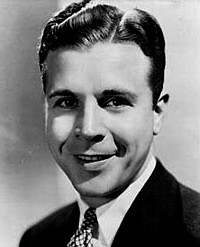 Up until 1949, Dick Powell could be divided into periods. Prior to his 1944 break-out performance as Philip Marlowe in Murder, My Sweet, Powell had played in romantic comedies, often of the musical variety, as the light-leading man. After Murder My Sweet, Powell played a series of hard-boiled Noirish Characters in films such as Johnny O’Clock. Now, if only these two halves could be combined…
Up until 1949, Dick Powell could be divided into periods. Prior to his 1944 break-out performance as Philip Marlowe in Murder, My Sweet, Powell had played in romantic comedies, often of the musical variety, as the light-leading man. After Murder My Sweet, Powell played a series of hard-boiled Noirish Characters in films such as Johnny O’Clock. Now, if only these two halves could be combined…
And they were in Richard Diamond. The first half of the show, Diamond would be on the trail of desperate figures, there would be gun play, violence, and then lots of hardboiled smarting off. Then, after the bodies were carried away, he’d steal a few moments with his girl and sing her a song.
Houston, we have synergy.
It’s a fun show, with a great mix of action, comedy, and romance, the direction and writing talents of a young Blake Edwards, and the charisma of Dick Powell at the center of it all.
Richard Diamond ended as Powell focused more on television. In 1957, Richard Diamond came to television with David Janssen in the lead as Powell thought it was time for someone new. The series ran until 1960. Also, series creator Blake Edwards adapted an episode of Richard Diamond for his Peter Gunn series, “Let’s Kill Timothy.”
Fan vote: 21%
Honorable Mentions: Dick Powell in Rogue’s Gallery, Alice Curtain and Joseph Frost in Mr. and Mrs. North, and Claudia Morgan in The Thin Man.
Next week: ABC shows. Become a friend on Facebook to participate in this week’s poll at http://www.facebook.com/radiodetectives
If you enjoyed this post, you can have new posts about Detective stories and the golden age of radio and television delivered automatically delivered to your Kindle.

5 comments for “The Five Greatest Detectives No Radio Network Could Hold”